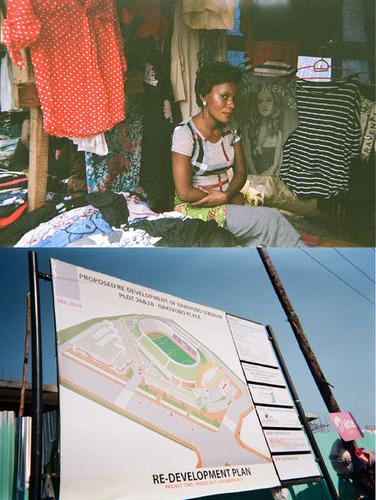当前位置:
X-MOL 学术
›
Trans. Instit. Br. Geogr.
›
论文详情
Our official English website, www.x-mol.net, welcomes your feedback! (Note: you will need to create a separate account there.)
“You Rise Up … They Burn You Again”: Market fires and the urban intimacies of disaster colonialism
Transactions of the Institute of British Geographers ( IF 3.445 ) Pub Date : 2020-07-29 , DOI: 10.1111/tran.12404 Caroline Faria 1 , Jovah Katushabe 2 , Catherine Kyotowadde 3 , Dominica Whitesell 1
Transactions of the Institute of British Geographers ( IF 3.445 ) Pub Date : 2020-07-29 , DOI: 10.1111/tran.12404 Caroline Faria 1 , Jovah Katushabe 2 , Catherine Kyotowadde 3 , Dominica Whitesell 1
Affiliation

|
In this paper we develop a feminist political ecology of disaster colonialism. To do so, we focus on a series of fires that devastated Park Yard Market in Kampala, Uganda, one of the largest retail spaces in East Africa. Officially accidental, rumours suggest the fires were deliberately set to displace traders and make way for the lucrative (re)development of the city‐centre land. Concerned less with the veracity of these rumours and more with their political ecologies, we show how narratives of Park Yard forwarded by the state and private interests indeed readied it for disaster. Here, we trace how colonial narratives of urban planning in the city, driven by technocratic imperatives of improvement, modernisation, and safety echo in the contemporary devaluation of Park Yard and its women traders. Against this, we show how the caring labour and investment by those traders was central to the formation and maintenance of the market. Over time they created an economically viable space, even as their work was devalued and legally unrecognised. Our analysis interrogates the colonial past‐presents and the gendered‐racialised logics of neoliberal urban development. This framing understands spectacular disaster, a series of highly destructive fires, as inextricably connected to historically produced systems of precarious urban marginality. It demonstrates the uneven impacts, and in particular the deeply deleterious impacts for low‐income Ugandan women; the relationship between fire disaster, vulnerability, and the labour of social reproduction; and the varied ways female traders resisted, adapted, and struggled to defend their economic space in the city. Specifically, a feminist political ecology also helps us understand the embodied nature of this relationship. That is, it is always produced through emotion‐laden, material, and corporeal gendered, racialised and classed power and both relies on and violates particular kinds of idealised or disposable urban subjectivities.
中文翻译:

“你崛起……他们再次烧死你”:市场大火和灾难殖民主义在城市的亲密关系
在本文中,我们发展了灾难殖民主义的女权政治生态学。为此,我们着眼于一系列大火,这场大火烧毁了乌干达坎帕拉(东非最大的零售空间之一)的帕克庭院市场。官方说法是偶然的,有传言称大火是故意烧毁商人的,并为城市中心土地的丰厚(重新)发展让路。我们较少关注这些谣言的真实性,而更多地关注它们的政治生态,我们展示了国家和私人利益所提出的帕克围场的叙事确实为灾难做好了准备。在这里,我们追踪了在改进帕克(Park Yard)及其女商人的当代贬值中,在技术,官僚主义的改善,现代化和安全问题的推动下,城市规划中的殖民叙事是如何产生的。反对这一点,我们展示了这些交易员的关怀劳动力和投资如何对市场的形成和维持至关重要。随着时间的流逝,他们创造了一个经济上可行的空间,即使他们的工作贬值且在法律上未被认可。我们的分析询问了新自由主义城市发展的殖民历史和性别种族逻辑。这个框架理解了壮观的灾难,一系列破坏性很强的大火,与历史悠久的不稳定城市边缘化系统有着千丝万缕的联系。它显示了不均衡的影响,特别是对低收入乌干达妇女的严重有害影响;火灾,脆弱性与社会再生产劳动之间的关系;女商人抵制,适应和努力捍卫城市经济空间的方式也多种多样。具体而言,女权主义的政治生态学也有助于我们理解这种关系的内在本质。也就是说,它总是通过充满情感的,物质的和有性别的,种族化的和阶级的力量产生的,并且都依赖于并违反了特定类型的理想化或可抛弃的城市主观性。
更新日期:2020-07-29
中文翻译:

“你崛起……他们再次烧死你”:市场大火和灾难殖民主义在城市的亲密关系
在本文中,我们发展了灾难殖民主义的女权政治生态学。为此,我们着眼于一系列大火,这场大火烧毁了乌干达坎帕拉(东非最大的零售空间之一)的帕克庭院市场。官方说法是偶然的,有传言称大火是故意烧毁商人的,并为城市中心土地的丰厚(重新)发展让路。我们较少关注这些谣言的真实性,而更多地关注它们的政治生态,我们展示了国家和私人利益所提出的帕克围场的叙事确实为灾难做好了准备。在这里,我们追踪了在改进帕克(Park Yard)及其女商人的当代贬值中,在技术,官僚主义的改善,现代化和安全问题的推动下,城市规划中的殖民叙事是如何产生的。反对这一点,我们展示了这些交易员的关怀劳动力和投资如何对市场的形成和维持至关重要。随着时间的流逝,他们创造了一个经济上可行的空间,即使他们的工作贬值且在法律上未被认可。我们的分析询问了新自由主义城市发展的殖民历史和性别种族逻辑。这个框架理解了壮观的灾难,一系列破坏性很强的大火,与历史悠久的不稳定城市边缘化系统有着千丝万缕的联系。它显示了不均衡的影响,特别是对低收入乌干达妇女的严重有害影响;火灾,脆弱性与社会再生产劳动之间的关系;女商人抵制,适应和努力捍卫城市经济空间的方式也多种多样。具体而言,女权主义的政治生态学也有助于我们理解这种关系的内在本质。也就是说,它总是通过充满情感的,物质的和有性别的,种族化的和阶级的力量产生的,并且都依赖于并违反了特定类型的理想化或可抛弃的城市主观性。


























 京公网安备 11010802027423号
京公网安备 11010802027423号